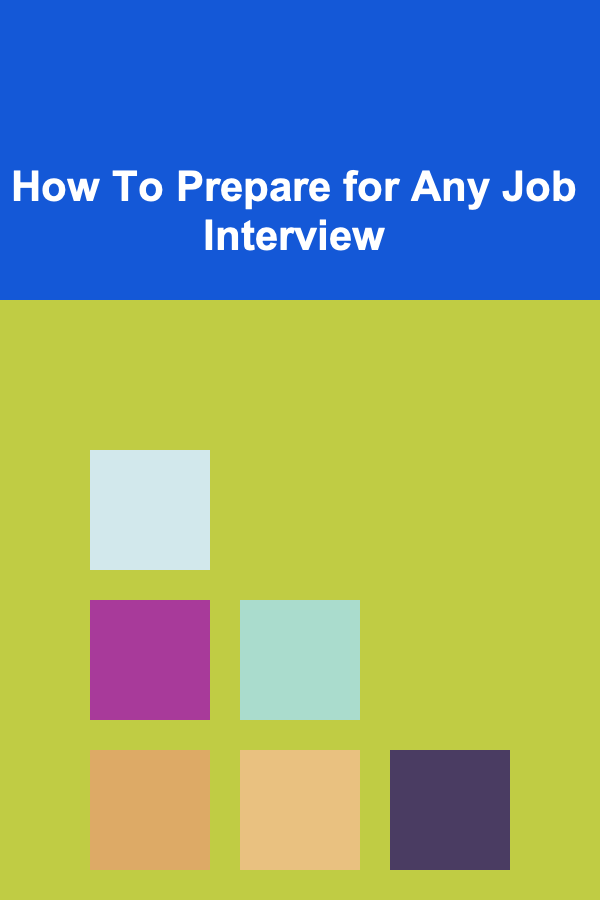
How To Prepare for Any Job Interview
ebook include PDF & Audio bundle (Micro Guide)
$12.99$11.99
Limited Time Offer! Order within the next:

Job interviews can be one of the most nerve-wracking experiences in one's professional journey, yet they are also the most crucial. They are the gateway between a job seeker and their desired career. While every interview is unique and each company has its own style, there are universal strategies and approaches that can help anyone succeed. This article delves into the essential steps and tips for preparing for any job interview, offering deep insights that go beyond the basics and provide real-world advice for a successful outcome.
Understand the Job Description
The first step in preparing for any job interview is to gain a deep understanding of the job you are applying for. Every job description offers valuable information about the expectations, responsibilities, and qualifications required for the role. It's not enough to simply read through it; you need to analyze the job description thoroughly and align it with your skills and experiences.
- Break down the skills required: Look for key skills or competencies that are repeatedly mentioned. These could be technical skills (e.g., coding, financial analysis, project management) or soft skills (e.g., communication, problem-solving, leadership). Understanding these key attributes helps you emphasize your strengths during the interview.
- Match your experience: Make a list of your experiences that align with the responsibilities outlined in the job description. Think about specific projects, achievements, or challenges you've tackled that demonstrate your capability in these areas.
- Research the company: Dive into the company's culture, values, and recent news. Visit their website, read press releases, and explore their social media. Knowing the company's ethos will help you better understand how you fit into their team and will provide material for thoughtful questions during the interview.
Research Common Interview Questions
Job interviews typically revolve around a core set of questions that explore your qualifications, experiences, and personality. While the specifics will vary depending on the job and the company, some questions are almost always asked. Prepare to answer these standard questions in a clear, concise, and compelling manner:
- Tell me about yourself: This is often the first question asked in interviews. The key is to present a brief summary of your background, focusing on your professional achievements and how they relate to the role you're applying for.
- Why do you want to work here?: This is where your research into the company pays off. Employers want to know that you're genuinely interested in their organization and the job, not just looking for any position.
- What are your strengths and weaknesses?: When talking about strengths, be sure to give concrete examples of how your strengths have helped in your previous roles. For weaknesses, choose something that you're actively working to improve and explain how you're addressing it.
- Describe a challenge you faced and how you overcame it: Use the STAR method (Situation, Task, Action, Result) to structure your answer. This technique helps you tell a clear, concise story that highlights your problem-solving abilities and results.
- Where do you see yourself in five years?: Employers are interested in your career trajectory and whether you're likely to stay with their company long-term. Show that you're motivated and have a vision for your growth, while also demonstrating alignment with the company's goals.
By anticipating and preparing for these common questions, you'll be able to confidently respond and make a strong impression.
Tailor Your Resume to the Job
Your resume is often your first introduction to a potential employer, so it must reflect your qualifications and experiences in the best light. However, sending the same generic resume for every job isn't the most effective approach. Tailor your resume for each specific position to showcase your most relevant skills and experiences.
- Highlight relevant skills: If a job emphasizes certain technical skills (e.g., programming languages, project management tools, software proficiency), make sure those skills are prominent on your resume. Use keywords from the job description to increase the chances of your resume passing through applicant tracking systems (ATS).
- Quantify your achievements: Numbers provide concrete evidence of your impact. For example, instead of saying "Managed a team," say "Managed a team of 10 people and increased sales by 15% in six months." This not only shows what you did but also the tangible results of your efforts.
- Show progression: Employers want to see how you've advanced in your career. Whether it's through promotions, new skills, or added responsibilities, make sure your resume reflects your growth and ambition.
- Proofread: A resume with typos or formatting issues reflects poorly on your attention to detail. Proofread carefully, or even ask someone else to review it for you.
Practice, Practice, Practice
One of the most effective ways to prepare for an interview is to practice your responses. It's one thing to think about how you'll answer a question, but it's another to articulate your thoughts clearly and confidently under pressure. Here's how to practice effectively:
- Mock interviews: Arrange mock interviews with a friend, mentor, or career coach. Simulate the real interview environment as much as possible. Ask for constructive feedback on your answers, body language, and tone.
- Record yourself: Use your phone or a webcam to record yourself answering interview questions. This allows you to review your performance and make adjustments. Pay attention to your body language, eye contact, and speaking speed.
- Refine your answers: As you practice, fine-tune your answers to sound natural. Avoid memorizing responses verbatim---interviews are a conversation, and you want your answers to sound authentic, not rehearsed.
- Prepare for behavioral questions: Many interviews will feature behavioral questions, which assess how you've handled specific situations in the past. To prepare, review your experiences and think of examples that demonstrate your skills. Use the STAR method to structure your answers effectively.
Master Your Body Language
While your words are important, your body language can speak just as loudly. Positive body language can project confidence and professionalism, while poor body language may detract from your interview performance. Here are some tips:
- Make eye contact: This shows confidence and interest. Avoid staring, but ensure that you make regular eye contact with the interviewer.
- Smile: Smiling makes you appear approachable and positive. It can also help reduce nervousness and create a more relaxed atmosphere.
- Sit up straight: Good posture conveys confidence. Avoid slouching or leaning back too far in your chair.
- Avoid distracting habits: Fidgeting, tapping your foot, or crossing your arms can make you appear nervous or defensive. Keep your hands on the table or in your lap, and try to remain calm and composed.
Dress for Success
Your appearance matters in an interview. Dressing appropriately can make a lasting impression, even before you say a word. The key is to dress in a way that aligns with the company's culture and the role you're applying for.
- Research the dress code: Some companies have a formal dress code, while others are more casual. If you're unsure, it's safer to err on the side of professionalism. A business suit is generally a safe bet for corporate positions, while business casual attire may be suitable for more relaxed environments.
- Grooming: Pay attention to your grooming, including your hairstyle, nails, and hygiene. Neatness is important, as it shows that you take the opportunity seriously and care about your presentation.
- Avoid distractions: Refrain from wearing flashy jewelry, excessive makeup, or strong fragrances. You want the focus to be on you and your qualifications, not your appearance.
Prepare Questions for the Interviewer
While you're preparing answers for the interview, don't forget to prepare insightful questions for the interviewer. This shows that you've done your research and are genuinely interested in the role and the company.
- Ask about the company culture: "Can you tell me more about the company culture and the team I would be working with?"
- Inquire about growth opportunities: "What opportunities for growth and advancement does the company offer?"
- Clarify expectations: "What would a typical day in this role look like? What are the most important challenges I would face?"
- Show enthusiasm: Asking questions demonstrates that you're engaged and enthusiastic about the role, which can set you apart from other candidates.
Manage Your Nerves
It's completely natural to feel nervous before an interview, but it's important not to let your nerves affect your performance. Here are some techniques to manage anxiety:
- Deep breathing: Take a few deep breaths before the interview to calm your nerves and center yourself.
- Positive visualization: Visualize yourself succeeding in the interview. Imagine walking in with confidence, answering questions with ease, and leaving the interview feeling accomplished.
- Remember that it's a conversation: Instead of seeing the interview as a test, think of it as a conversation. The interviewer wants to get to know you, and you're also assessing whether the company is a good fit for you.
Follow Up After the Interview
After the interview, send a thank-you email to express your appreciation for the opportunity. This is your chance to reiterate your interest in the position and reinforce your qualifications.
- Be prompt: Send the thank-you note within 24 hours of the interview.
- Personalize the message: Reference something specific from the interview that stood out to you or that you enjoyed discussing.
- Express enthusiasm: Reaffirm your excitement about the opportunity and how your skills align with the role.
Conclusion
Preparing for a job interview is an essential skill that can dramatically improve your chances of success. By understanding the job description, researching the company, practicing your responses, managing your body language, and dressing appropriately, you set yourself up for success. Most importantly, remember that an interview is an opportunity for both you and the employer to determine if you are a good fit for each other. So approach it with confidence, authenticity, and enthusiasm.

How to Evaluate Stocks Before Making an Investment Decision
Read More
How to Identify the Right Processes to Automate in Small Businesses
Read More
How To Paint Realistic Eyes, Noses, and Mouths
Read More
How to Set Up a Family Sports Day in Your Backyard
Read More
How to Use Social Media to Enhance Your Home Party Experience
Read More
How to Use Tackle Boxes for Essential Oil Organization
Read MoreOther Products

How to Evaluate Stocks Before Making an Investment Decision
Read More
How to Identify the Right Processes to Automate in Small Businesses
Read More
How To Paint Realistic Eyes, Noses, and Mouths
Read More
How to Set Up a Family Sports Day in Your Backyard
Read More
How to Use Social Media to Enhance Your Home Party Experience
Read More